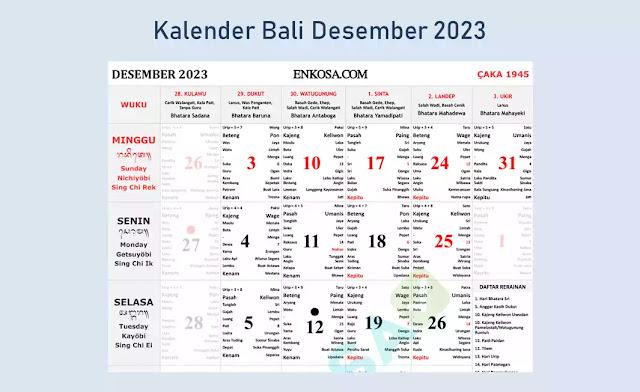Have you ever wondered how time could be perceived and measured differently? Let’s dive into the intriguing world of the Pawukon calendar of Bali, a system so unique that it transcends the mere tracking of days and delves into the spiritual and cultural rhythms of life.
Origins and History
The Pawukon calendar isn’t just a way to mark time; it’s a legacy, steeped in the history and mystique of Bali. Born from a blend of Hindu-Javanese culture and indigenous Balinese customs, this calendar is a tapestry of Bali’s past, weaving together its spiritual journey and societal evolution.
The Significance of Pawukon
But why does Pawukon matter? It’s not just a calendar; it’s the heartbeat of Balinese culture, influencing everything from religious ceremonies to daily activities. Understanding Pawukon is like holding a key to the spiritual and communal life of Bali.
How the Pawukon Calendar Works
At first glance, Pawukon might seem bewildering with its complex cycles and layers. However, it’s this very complexity that encapsulates the Balinese view of the cosmos and their place within it. Let’s break it down and see how this fascinating system operates.
The Structure of the Pawukon
Dive deeper into the Pawukon and you’ll find a structure of cycles within cycles, a harmonious blend of timekeeping and cultural symbolism. From the Wewaran to the ten-week system, each layer adds depth and meaning to the Balinese way of life.
The Wewaran Cycle
Central to the Pawukon is the Wewaran, a 10-day week that dictates everything from market days to sacred rituals. But it’s more than just a cycle; it’s a guide for harmony and balance in the Balinese way of life.
The Ten-Week System
Imagine a calendar where weeks aren’t just seven days but extend to ten, creating a rhythm unique to Bali. This ten-week system is a testament to the island’s innovative approach to time and its cultural significance.
Important Days and Celebrations
In the Pawukon calendar, certain days and periods hold special significance, marking times for celebration, reflection, or communal activities. These are not just dates but moments of cultural and spiritual importance.
Wuku: The Heart of Bali’s Pawukon Calendar

The Pawukon calendar is an integral part of Balinese culture, and at its heart lies the Wuku cycle, a unique aspect that plays a significant role in the island’s religious, cultural, and agricultural life. This article explores the Wuku system, its origins, structure, and its pervasive influence on the daily life of the Balinese people.
Introduction to Wuku
Wuku is a series of 30 weeks used in the Pawukon calendar, each with a unique name and associated with specific cultural and religious beliefs. This cycle is crucial for determining auspicious days for ceremonies, farming, and even personal milestones.
Origins and Significance of Wuku
Historical Context
Wuku’s origins are as mystic and intricate as the culture of Bali itself, rooted in ancient Javanese traditions and influenced by Hinduism. Understanding its history provides insight into its profound place in Balinese society.
Religious and Cultural Importance
In Bali, Wuku is not just a calendar system; it’s a way of life. It dictates the timing of ceremonies, festivals, and daily activities, reflecting the island’s deep spiritual and cultural values.
Structure of the Wuku Cycle
The 30 Wuku Weeks
Each of the 30 weeks in the Wuku cycle has a specific name and significance, influencing everything from agricultural practices to spiritual ceremonies. This section explores each week and its meaning.
Integration with Other Cycles
Wuku is part of a larger system of cycles within the Pawukon calendar. Understanding how it integrates with other cycles reveals the complexity and sophistication of Balinese timekeeping.
Wuku’s Impact on Balinese Life
Agricultural Practices
Wuku is deeply intertwined with Bali’s agricultural cycle, guiding farmers on when to plant, harvest, and perform rituals for a bountiful crop.
Religious Ceremonies and Festivals
Many of Bali’s religious ceremonies and festivals are scheduled according to the Wuku cycle, marking times for community gathering, celebration, and prayer.
Cultural Impact
The Pawukon’s influence permeates Balinese art, society, and daily life, shaping everything from the intricate patterns of dance and music to the timing of agricultural activities. It’s a calendar that’s lived and breathed in every aspect of Balinese culture.
Religious Ceremonies and Rituals
For the Balinese, religious ceremonies and rituals are inextricably linked to the Pawukon calendar. Understanding this connection offers insight into the spiritual depth and rhythmic flow of Balinese Hinduism.
Influence on Daily Life
But how does the Pawukon impact everyday life in Bali? From deciding auspicious days for events to the practicalities of planning, the calendar is a constant, guiding presence in the life of the Balinese people.
Comparisons with Other Calendars
When placed side by side with the Gregorian or other lunar calendars, the Pawukon reveals its uniqueness as well as surprising similarities. What can we learn from these comparisons, and how do they enrich our understanding of timekeeping traditions worldwide?
Pawukon vs. Gregorian Calendar
The Gregorian calendar may dominate much of the world, but in the shadows of Bali’s temples and rice fields, the Pawukon offers a different perspective on time. Comparing these systems highlights the diversity and ingenuity of human culture.
Similarities with Other Lunar Calendars
Despite its distinctiveness, the Pawukon shares common threads with other lunar calendars across the globe. Exploring these similarities reveals a shared human quest to understand and organize time.
Preserving the Pawukon
In a rapidly changing world, the preservation of the Pawukon calendar is a challenge that speaks to the broader issues of cultural identity and heritage. How is Bali responding to these challenges, and what does the future hold for this ancient timekeeping system?
Challenges and Adaptations
As modernity encroaches, the Pawukon faces challenges in remaining relevant and understood. Yet, it’s also seeing adaptations, finding its place in a world where ancient wisdom and contemporary life meet.
Importance of Preservation
Preserving the Pawukon isn’t just about maintaining a calendar; it’s about holding onto a worldview, a way of life that offers profound insights into balance, spirituality, and community.
Learning and Using Pawukon
Interested in incorporating the Pawukon into your life or simply learning more about it? Here are some resources and tips for delving into this rich and complex system.
Resources for Learning
From online resources to community workshops, there are numerous ways to explore the Pawukon calendar. Whether you’re a scholar, a traveler, or simply curious, there’s a pathway for you to begin this journey.
Practical Tips for Integration
Adopting aspects of the Pawukon into your daily routine can offer a fresh perspective on time and rhythm. Here are some practical tips for aligning with the Balinese cycle of days and weeks.
The Pawukon calendar of Bali is more than a method of marking days; it’s a window into the soul of Bali, reflecting its history, spirituality, and community. In understanding Pawukon, we gain not just knowledge of another culture but a deeper appreciation for the diverse ways humanity perceives and celebrates time.










